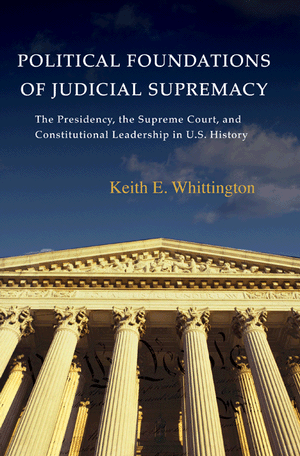Keith E. Whittington, William Nelson Cromwell Professor of Politics, Princeton University has a new book, just out: Political Foundations of Judicial Supremacy: The Presidency, the Supreme Court, and Constitutional Leadership in U.S. History. I have not yet seen it, but Whittington's work on American constitutionalism is essential reading. Here's the press blurb: 
Should the Supreme Court have the last word when it comes to interpreting the Constitution? The justices on the Supreme Court certainly seem to think so--and their critics say that this position threatens democracy. But Keith Whittington argues that the Court's justices have not simply seized power and circumvented politics. The justices have had power thrust upon them--by politicians, for the benefit of politicians. In this sweeping political history of judicial supremacy in America, Whittington shows that presidents and political leaders of all stripes have worked to put the Court on a pedestal and have encouraged its justices to accept the role of ultimate interpreters of the Constitution.
Whittington examines why presidents have often found judicial supremacy to be in their best interest, why they have rarely assumed responsibility for interpreting the Constitution, and why constitutional leadership has often been passed to the courts. The unprecedented assertiveness of the Rehnquist Court in striking down acts of Congress is only the most recent example of a development that began with the founding generation itself. Presidential bids for constitutional leadership have been rare, but reflect the temporary political advantage in doing so. Far more often, presidents have cooperated in increasing the Court's power and encouraging its activism. Challenging the conventional wisdom that judges have usurped democracy, Whittington shows that judicial supremacy is the product of democratic politics.

Should the Supreme Court have the last word when it comes to interpreting the Constitution? The justices on the Supreme Court certainly seem to think so--and their critics say that this position threatens democracy. But Keith Whittington argues that the Court's justices have not simply seized power and circumvented politics. The justices have had power thrust upon them--by politicians, for the benefit of politicians. In this sweeping political history of judicial supremacy in America, Whittington shows that presidents and political leaders of all stripes have worked to put the Court on a pedestal and have encouraged its justices to accept the role of ultimate interpreters of the Constitution.
Whittington examines why presidents have often found judicial supremacy to be in their best interest, why they have rarely assumed responsibility for interpreting the Constitution, and why constitutional leadership has often been passed to the courts. The unprecedented assertiveness of the Rehnquist Court in striking down acts of Congress is only the most recent example of a development that began with the founding generation itself. Presidential bids for constitutional leadership have been rare, but reflect the temporary political advantage in doing so. Far more often, presidents have cooperated in increasing the Court's power and encouraging its activism. Challenging the conventional wisdom that judges have usurped democracy, Whittington shows that judicial supremacy is the product of democratic politics.
Mark Graber at Balkinization calls the book a "must read for any one interested in American constitutional law, history and politics." Graber continues:
Unlike traditional scholars, who tell the story of American constitutional development through the lens of the Supreme Court, Whittington tells the story of American constitutional development, American judicial development, in particular, through the lens of the presidency. His work highlights how presidents in different phases of political time sometimes champion and sometimes oppose judicial power, and how the construction of judicial power in the United States is in large part the outcome of presidential efforts over time to fashion a federal judiciary that would serve a complex set of executive interests. As I say on the back of the book, "the historical evidence is complete and compelling" (Mark Tushnet uses the words "elegant, clearly presented, and persuasive"). Most important for readers interested in contemporary constitutional politics, Whittington makes clear that we will not understand the likely trajectory of the Roberts Court and the present Republican affinity for judicial activism unless we understand the reasons why the Bush administration has sought to fashion an exceptionally active judiciary, in particular one likely to be increasingly committed to executive power.